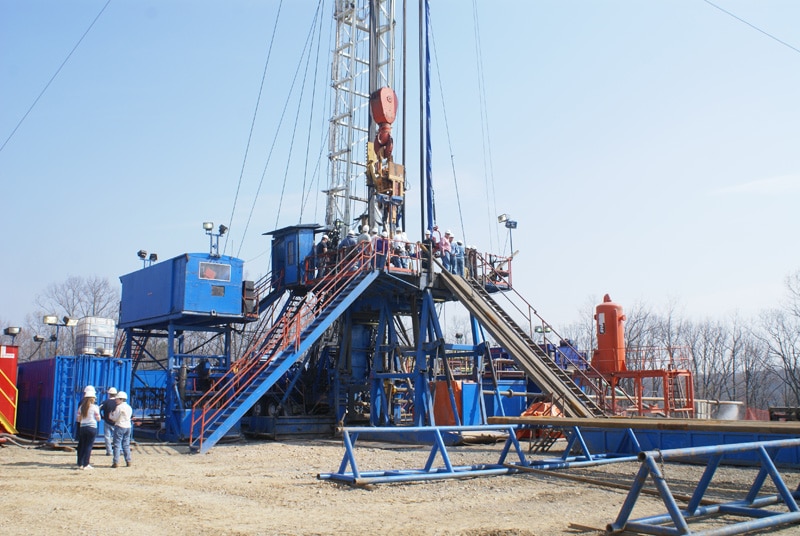In the wake of the EU referendum, there emerged a slew of articles discussing how Brexit might give rise to a ‘fracking free for all’.
And as we reported last week, the cabinet reshuffle prompted by Brexit has left us with a more right-wing, anti-regulation and likely pro-gas government.
But the act itself of leaving the EU will have little bearing on the number of permits for shale gas testing granted by the government, experts have said.
In fact, the number of permits granted will increase simply because the government is pro-fracking, explained David Powell of the New Economics Foundation. He said: “This is a government that wants to frack. It is not any more popular than it ever was.
“It is extremely unlikely the government will back down on fracking. We will see more applications going in because the government wants to see more applications going in. That is just generally the case.”
The British government has already for years lobbied against tougher regulations on fracking within the EU.
This government has done a huge amount publicly and not so publicly to get fracking happening,” Powell added, “be that the most generous tax breaks for fracking rigs in the world, or bribes for local communities to get them to accept it, or overriding local planning decisions. All of that is happening irrespective of the EU.”
Emissions
Richard Black, director of the Energy and Climate Intelligence Unit (ECIU), agreed that we will “likely see an increase in approvals of permits certainly to explore for shale gas.”
But there will be another set of hoops to jump through before commercial extraction can begin, Black said.
“If a company puts in an application to do this stuff commercially then there will be a lot of pressure on Mr Clark to make sure this will not result in a net increase in UK emissions.
“We’ve seen from US that you can have shale gas wells where the leakage rate is virtually zero, or where it is in the order of up to 8 percent. That makes a heck of a difference to the overall carbon footprint of your shale gas operations.
“So any government that takes climate change seriously has got to take that into consideration.”
The above mentioned Greg Clark MP, head of the new Business, Energy and Industrial Innovation (BEIS) department that will look after climate change, has generally voted against greater regulation of fracking, according to They Work For You.
And as communities secretary, Mr Clark in August last year issued new planning guidance allowing government to step in should councils fail to fast-track fracking applications.
As well as having low leakage waste, shale gas must replace higher carbon alternatives if it is to reduce emissions, Black added.
“Currently Britain does not mandate those two things. It could decide to – that will be an interesting one to watch.”
Disappearing directives
On top of leakage waste and emissions, the UK’s fracking regulations that come from the EU are also something to look out for.
The UK is subject to several EU directives governing fracking, including those on environmental impact, water contamination, habitats, and chemicals.
Dr. Doug Parr, Policy Director at Greenpeace UK, warned some directives could disappear completely.
“Weak and patchy as they are, the UK‘s fracking regulations could be even worse without the bedrock provided by over a dozen separate EU directives, some of which are now at risk of disappearing altogether,” said Parr.
“Theresa May’s new cabinet now faces a clear choice between promoting this climate-wrecking industry or backing clean, home-grown, reliable renewable energy and smart technologies instead.”
E3G has also renewed its call on the government to abandon fracking. Chairman Tom Burke told DeSmog UK: “Clearly there is a risk that Brexit will lead to a fall in environmental standards. But there is no need to run that risk at all with fracking.
“Gas demand is falling as our buildings become more efficient and renewables, interconnection and storage make gas unnecessary for electricity.”
But a BEIS spokesman said that shale gas was a “fantastic opportunity” which could “create thousands of jobs across the country and a secure home grown energy source that we can rely on for decades to come”.
Money talks
So if Brexit itself will have little bearing on the UK government’s will to frack, what will?
“Ultimately it will be decided on economic grounds, and related to that, is whether it is publicly acceptable,” said Black, director of the ECIU.
“As always, the economic case depends on a) how expensive it is to get it out the ground and b) what projections people are making about the price of gas going forward, which is one of the most difficult things of all things to predict.
“So those will be more important to the future of shale gas.”
Photo: Penn State via Flickr
Subscribe to our newsletter
Stay up to date with DeSmog news and alerts







